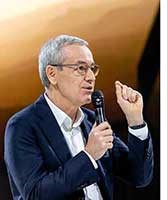Veuillez accepter les cookies "marketing" pour voir cette vidéo.
A recovery plan to speed up the ecological transition
On Thursday 3 September, the government presented its France Relance plan, a road map “for the economic, social and ecological reconstruction of the country” following the Covid-19 health crisis. Of the €100bn promised by the government, €30bn will be devoted to the ecological transition, in several strategic areas: in particular, the energy renovation of buildings (a budget of €2bn), green infrastructure and mobility (€1.2bn), decarbonisation of industry (€1.2bn) and the development of green technologies (€2bn). The goal is ambitious: to make France the first major carbon-free economy in Europe.
Driven by our purpose, “to act to accelerate the transition towards a carbon-neutral economy”, our Group has called several times since the end of lockdown for the recovery to be used as a lever to speed up the transition of the economic model.

The first issue is the urgent need to implement the recovery plan, as explained on French radio Europe 1 by Jean-Pierre Clamadieu, Chairman of the Group’s Board of Directors: “There is an urgent need to put the recovery plan measures in place very quickly. It’s a question of weeks, of months. It is absolutely essential that the plan is applied to concrete projects, ready to start very quickly.”
A recovery plan in line with the Group’s priorities
The recovery plan will consist, in particular for the pillar devoted to ecological transition, of calls for projects that will direct public investment towards projects that are beneficial for the environment. The first such calls were launched at the end of August 2020 and will close in mid-October.
“The second lesson is that they must be targeted at creating long-term social and ecological value,” said Claire Waysand, ENGIE’s interim CEO, at the Forum of the Americas. “The first of the challenges facing our societies is social cohesion: in a number of societies, inequalities have been growing and that’s a threat to social cohesion.”
Claire Waysand, Miami Conference/Forum of the Americas, 01/09/2020: “Powering the green recovery through public private partnerships”

 Judith Hartmann, Executive Vice President and Chief Financial Officer, spoke on this subject on 14 September, on online French TV channel BSmart
Judith Hartmann, Executive Vice President and Chief Financial Officer, spoke on this subject on 14 September, on online French TV channel BSmart
